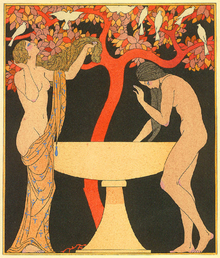 Illustration by Georges Barbier for The Songs of Bilitis | |
| Author | Pierre Louÿs |
|---|---|
| Original title | Les Chansons de Bilitis |
| Language | French |
| Genre | Poetry, erotica |
Publication date | 1894 |
| Publication place | France |
| Media type | |
The Songs of Bilitis (/bɪˈliːtɪs/; French: Les Chansons de Bilitis) is a collection of erotic, essentially lesbian, poetry by Pierre Louÿs published in Paris in 1894. Since Louÿs claimed that he had translated the original poetry from Ancient Greek, this work is considered a pseudotranslation.[1] The poems were actually clever fabulations, authored by Louÿs himself, and are still considered important literature.
The poems are in the manner of Sappho; the collection's introduction claims they were found on the walls of a tomb in Cyprus, written by a woman of Ancient Greece called Bilitis (Greek: Βιλιτις), a courtesan and contemporary of Sappho's to whose life Louÿs dedicated a small section of the book. On publication, the volume deceived even expert scholars.[2]
Louÿs claimed the 143 prose poems, excluding 3 epitaphs, were entirely the work of this ancient poet—a place where she poured both her most intimate thoughts and most public actions, from childhood innocence in Pamphylia to the loneliness and chagrin of her later years.
Although for the most part The Songs of Bilitis is original work, many of the poems were reworked epigrams from the Palatine Anthology, and Louÿs even borrowed some verses from Sappho herself. The poems are a blend of mellow sensuality and polished style in the manner of Parnassianism, but underneath run subtle Gallic undertones that Louÿs could never escape.
To lend authenticity to the forgery, Louÿs in the index listed some poems as "untranslated"; he even craftily fabricated an entire section of his book called "The Life of Bilitis", crediting a certain fictional archaeologist Herr G. Heim ("Mr. C. Cret" in German) as the discoverer of Bilitis's tomb. And though Louÿs displayed great knowledge of Ancient Greek culture, ranging from children's games in "Tortie Tortue" to application of scents in "Perfumes", the literary fraud was eventually exposed. This did little, however, to taint their literary value in readers' eyes, and Louÿs's open and sympathetic celebration of lesbian sexuality earned him sensation and historic significance.
- ^ Venuti, Lawrence (1998). The Scandals of Translation. New York: Routledge. pp. 34–39.
- ^ Skucha, Mateusz (2019). "Bilitis. Między tekstem pornograficznym a tekstem lesbijskim". Śląskie Studia Polonistyczne (in Polish). 1 (13): 113–130. ISSN 2084-0772.